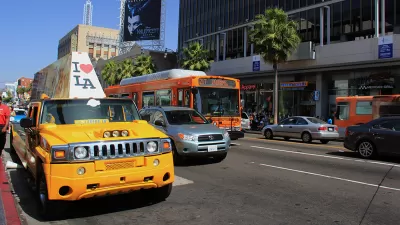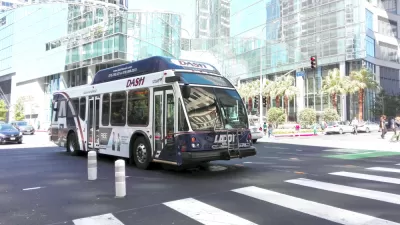What's it like to lead the department of transportation in a city trying to overcome decades of car-centric planning? Let LADOT General Manager Seleta Reynolds tell it in her own words.

Eddie Kim interviews Seleta Reynolds, the general manager of the city of Los Angeles' Department of Transportation, who was hired by mayor Eric Garcetti "with an eye toward finding ways to improve the city not just for drivers, but also for walkers, cyclists and transit users."
The interview begins with a discussion of the city bus service known as the DASH, which is close to completing a service expansion that keeps up with the changes in Downtown (such as the ongoing investment in the Arts District).
Also discussed in the interview is the city's Vision Zero initiative, announced in August 2015, and setting a target for zero traffic fatalities by 2025. To summarize the current state of the LADOT's efforts on the Vision Zero initiative, Reynolds explains the following:
We’re almost done with our crash profiling, where we identify high-injury networks — where we have the most severe crashes with people walking or biking. Now we’re doing the deep dive into “Why?” It’s kind of like archaeology: What can we learn from the crash reports that we get from the enforcement side of the department, and how do we layer that info on top of what we know about the physical environment?
Reynolds makes another telling point when comparing the political culture of the San Francisco area, where she worked previously in her career, with that of Los Angeles. According to Reynolds, Los Angeles lacks the robust public dialogue found farther north. "There needs to be a safe space for that to occur," says Reynolds. "Part of that is, my engineers and planners need to know that if they make a mistake while speaking, I have their back. But it’s a lot of work, and not everyone is comfortable with it. This can lead to a place where people hold their cards very tightly and not be open and honest."
FULL STORY: Chatting With L.A. Transportation Master Seleta Reynolds

Planetizen Federal Action Tracker
A weekly monitor of how Trump’s orders and actions are impacting planners and planning in America.

Maui's Vacation Rental Debate Turns Ugly
Verbal attacks, misinformation campaigns and fistfights plague a high-stakes debate to convert thousands of vacation rentals into long-term housing.

Restaurant Patios Were a Pandemic Win — Why Were They so Hard to Keep?
Social distancing requirements and changes in travel patterns prompted cities to pilot new uses for street and sidewalk space. Then it got complicated.

In California Battle of Housing vs. Environment, Housing Just Won
A new state law significantly limits the power of CEQA, an environmental review law that served as a powerful tool for blocking new development.

Boulder Eliminates Parking Minimums Citywide
Officials estimate the cost of building a single underground parking space at up to $100,000.

Orange County, Florida Adopts Largest US “Sprawl Repair” Code
The ‘Orange Code’ seeks to rectify decades of sprawl-inducing, car-oriented development.
Urban Design for Planners 1: Software Tools
This six-course series explores essential urban design concepts using open source software and equips planners with the tools they need to participate fully in the urban design process.
Planning for Universal Design
Learn the tools for implementing Universal Design in planning regulations.
Heyer Gruel & Associates PA
JM Goldson LLC
Custer County Colorado
City of Camden Redevelopment Agency
City of Astoria
Transportation Research & Education Center (TREC) at Portland State University
Jefferson Parish Government
Camden Redevelopment Agency
City of Claremont





























